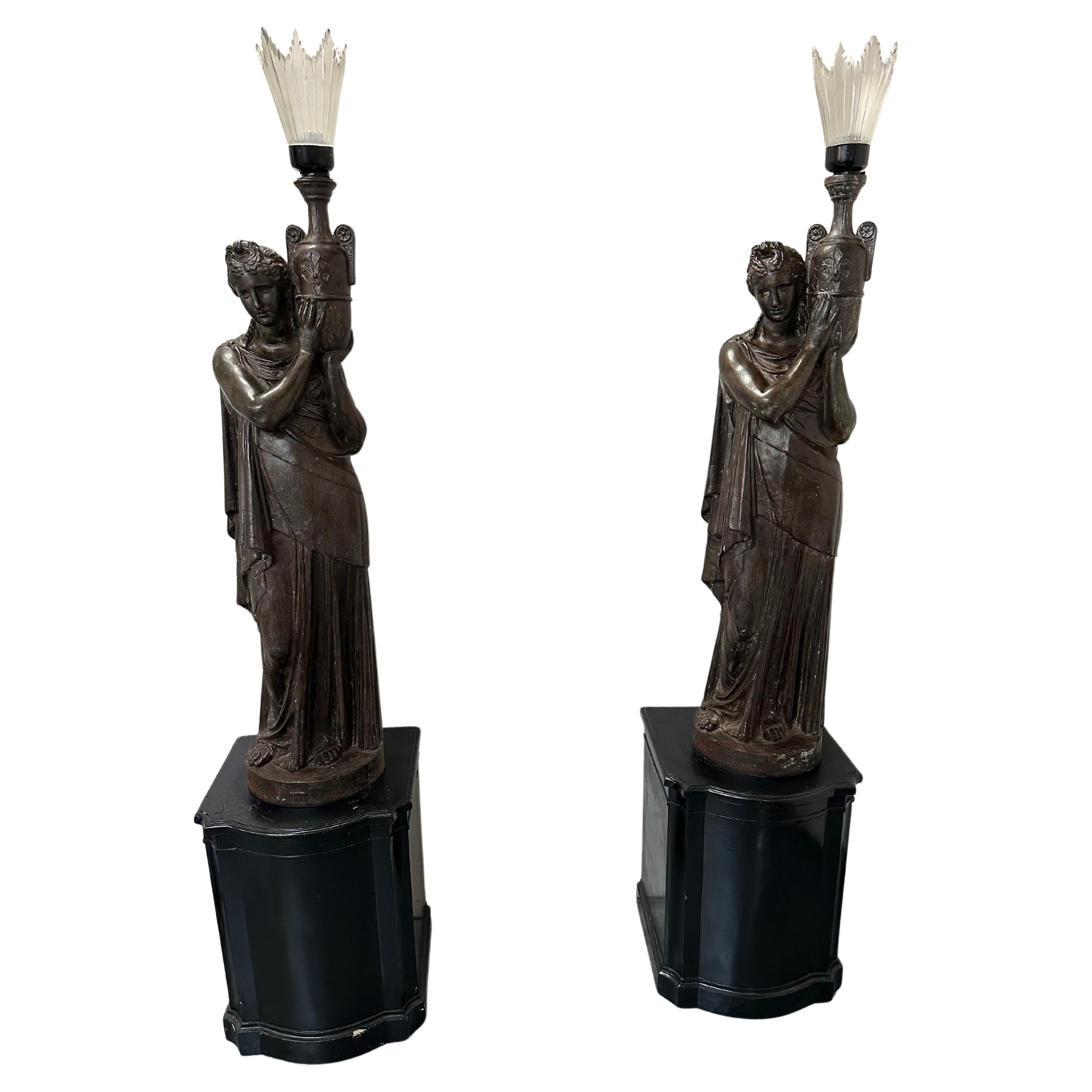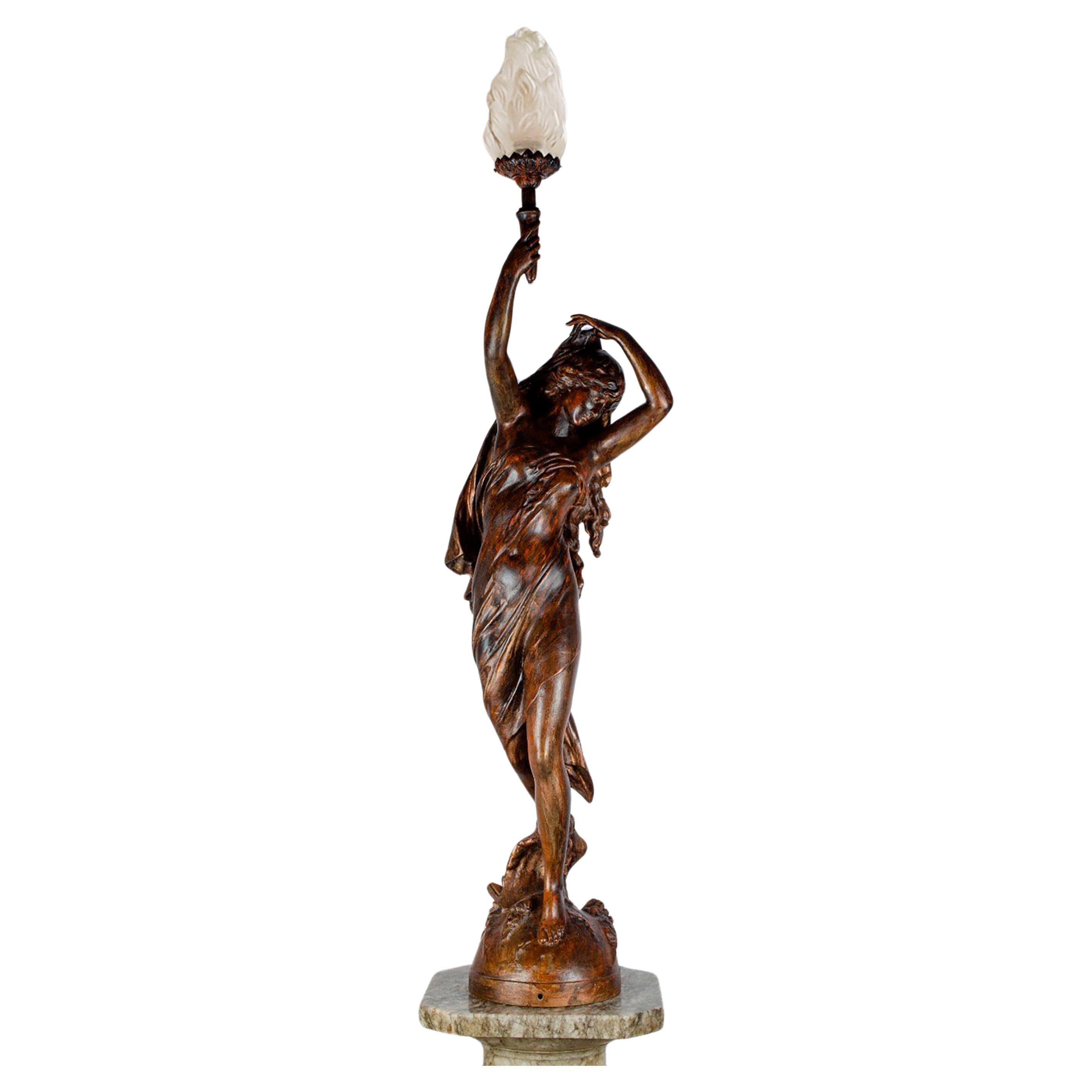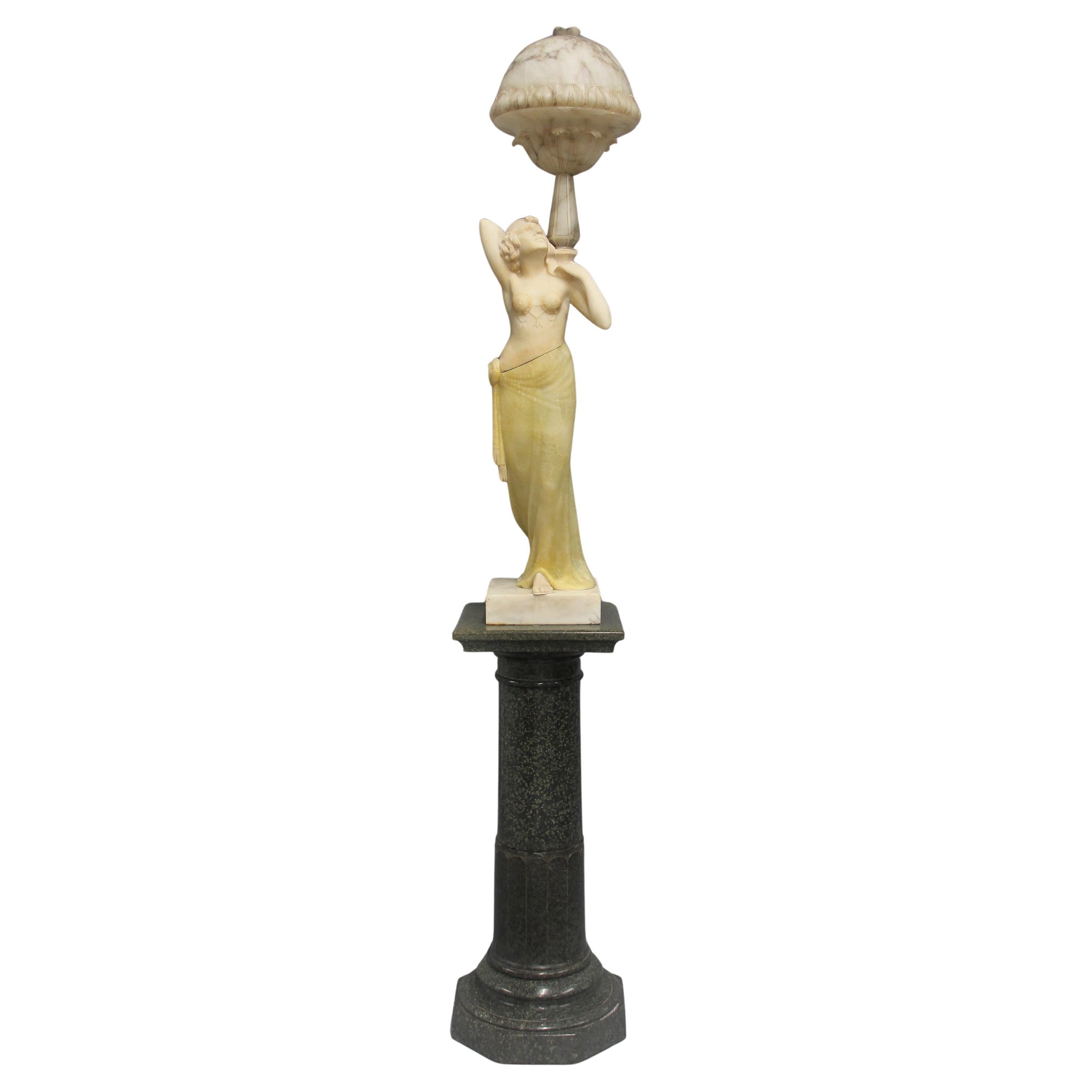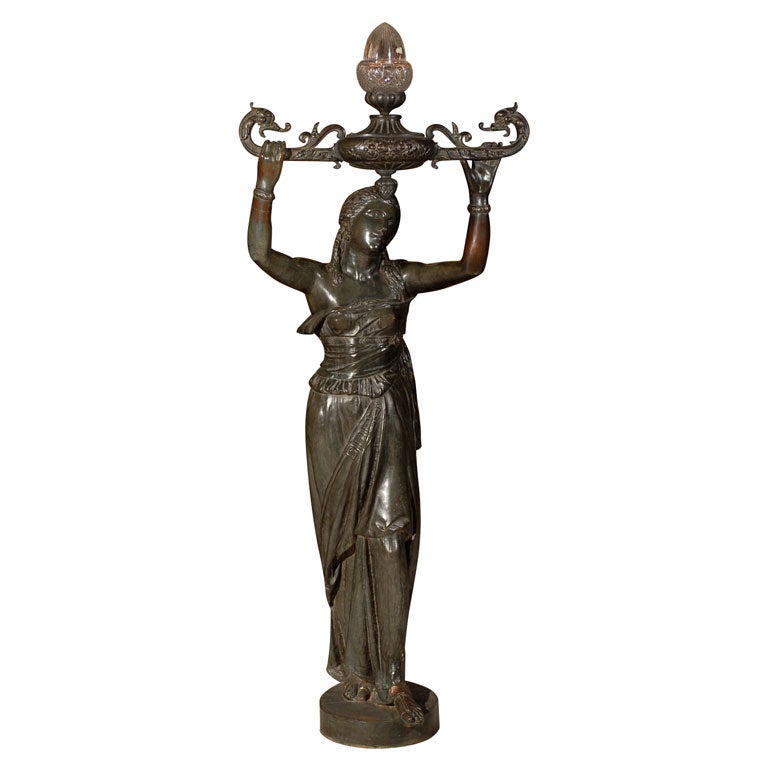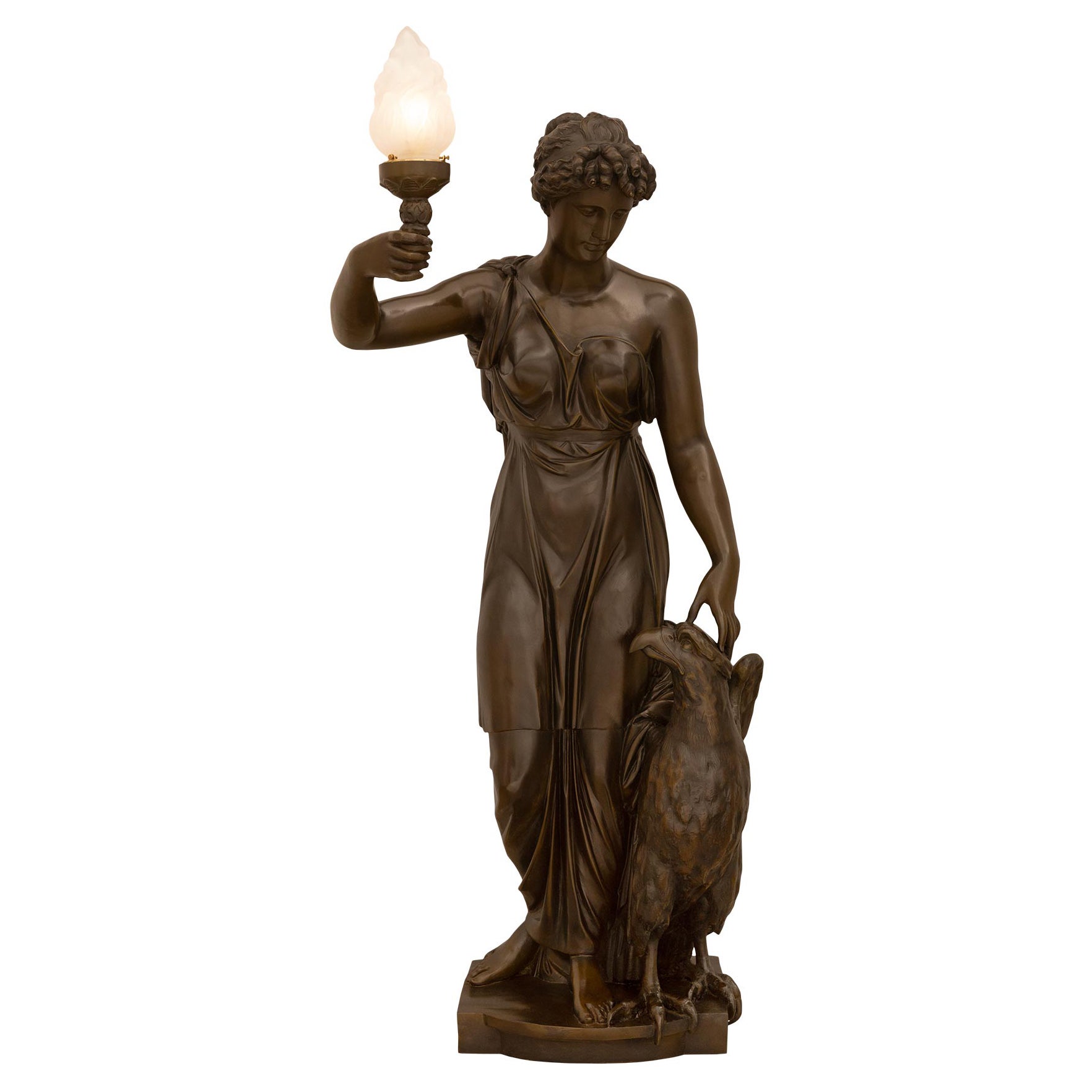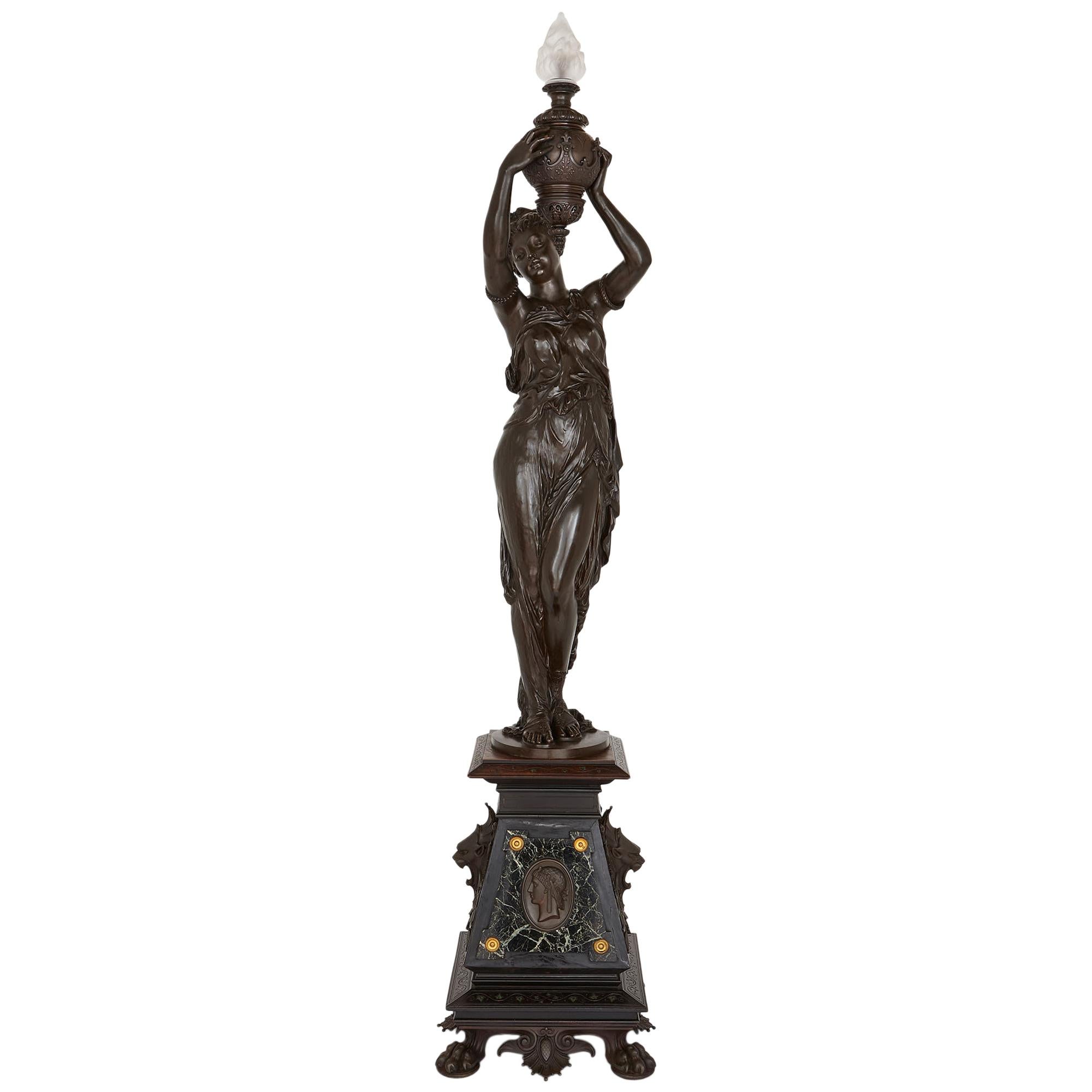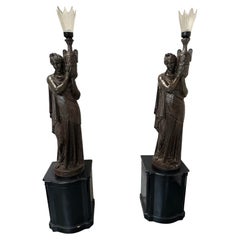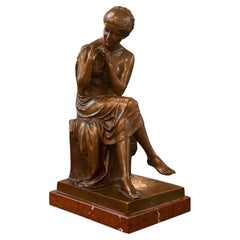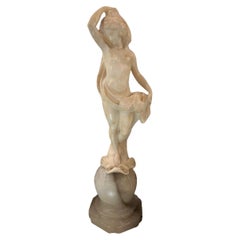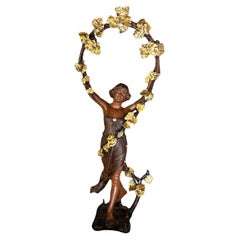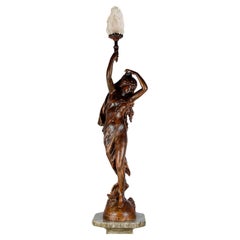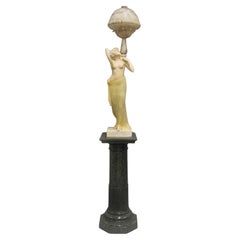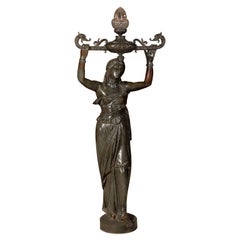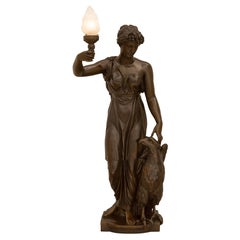Items Similar to Sculpture of Women with Light by Val D'Osne
Video Loading
Want more images or videos?
Request additional images or videos from the seller
1 of 22
Sculpture of Women with Light by Val D'Osne
$50,000
£37,704.96
€43,607.60
CA$70,149.74
A$77,975.79
CHF 40,873.24
MX$952,273.02
NOK 510,278.77
SEK 480,077.13
DKK 325,474.45
About the Item
They were exhibited at Palm beach "American International Fine Art Fair (AIFAF)"
Sculpture with lampshade Height: 162 cm (63.77 inch)
Sculpture Height: 142 cm (55.90 inch)
Diameter: 30 cm ( 11.81 inch)
The lampshade of the sculpture are not the original. We bought it without a lampshade. He has a missing finger.
Pushing the button that reads 'View All From Seller'. And you can see more objects to the style for sale.
Val D´OSNE
The popularity of cast iron in the second half of the 19th century was greater in france than anywhere else in Europe, where the firm of Val D'Osne had come to dominate production of cast-iron ornamentation. Officially known as Société Anonyme des Hauts-Fourneaux et Fonderies du Val-D'Osne, Anciennes maisons J. P. V. André et J. J. Ducel et Fils, the firm, commonly known simply as 'Val D'Osne', was originally founded in 1835 and developed rapidly by absorbing smaller foundries in the Haute-Marne area east of Paris. A frequent participant in the International Exhibitions, the foundry was awarded medals for their work during the latter half of the 19th century.
Why are there so many antiques in Argentina?
In the 1880 – 1940 there was a grate wave of immigration encouraged by the periods of war that were taking place.
1st World War took place between 1914 and 1918
2nd World War took place between 1939 and 1945
The immigrants options were New York or Buenos Aires. Tickets were cheap and in Buenos Aires they were welcomed with open arms, as it was a country where everything was still to be done.
Argentina was the country of new opportunities, labour was needed and religious freedom was assured, in many cases the of the family travel first until they were settled and then the rest of the family members join them.
In the immigrant museum “Ellis Island Immigrant Building” in New York you can se the promotional posters of the boats that would take them to a new life.
Between the years 1895 and 1896, Argentina had the highest DGP (gross domestic product) per capita in the world according to the Maddison Historical Statistics index, this situation arose due to the large amount of food being exported to European countries, which were at war.
The Argentinean ships left the port of Buenos Aires with food, but they returned with furniture, clothes and construction elements, (it´s common to see this the old buildings of the historic neighbourhood of San Telmo, the beams with the inscription “Made in England)”, as well as many markets that were built in Buenos Aires, such us the San Telmo Market, whose structure was brought by ship and afterwards assembled in 900 Defensa Street.
With the great influence of European immigrants living in the country, the children of the upper classes travelled to study in France, resulting in the inauguration of “La Maison Argentinienne”, on 27th of June 1928, in the international city of Paris, which hosted many Argentinians that were studying in Frace.
It´s the fourth house to be built after France, Canada and Belgium, being the first Spanish-speaking one. Still in place today (17 Bd Jourdan, 75014, Paris, France). Many of the children of these wealthy families who attended international art exhibitions, museums and art courses abroad, took a keen interest in the European style. This is why Buenos Aires was at the time referred as “The Paris of South America”.
Between the years 1890 and 1920 more than a hundred Palaces were built on Alvear Avenue the most exclusive avenue in Buenos Aires. Today some of these palaces have been transformed into museums, hotels and embassies.
In the year 1936, the Kavanagh building was inaugurated, it was the tallest reinforced concrete building in South America.
During 1994 the American Society of Civil Engineers distinguished it as an “international engineering milestone”, and it´s now considered a World Heritage of Modern Architecture.
At the time was common to hire foreign architects such as Le Corbusier, who visited Buenos Aires/Argentina in 1929 and in 1948 he drew up the blueprints for a house built in La Plata City (which was declared a World Heritage Site).
In 1947, the Hungarian architect Marcelo Breuer designed “Parador Ariston” in the seaside city of Mar del Plata. After an Argentinean student at Harvard University convinced him to come to Argentina. He worked on an urban development project in the Casa Amarilla, area of La Boca.
The Ukrainian architect, Vladimiro Acosta, arrives in Argentina in 1928 and worked as an architect until que moved to Brazil.
Antonio Bonet, a Spanish architect who worked with Le Corbusier in Paris, arrives in Argentina in 1937, where he carried out several architectural works and in 1938 designs the well-known BFK chair.
Andres Kálnay, of Hungarian origin, made around 120 architectural masterpieces, among which the former Munich brewery stands out, he even made the furniture’s design.
The German architect, Walter Gropius, director of the Bauhaus, lived in Argentina, where he wrote articles for “Sur” magazine and founded in Buenos Aires, an architectural firm with Franz Möller, who was also an architect, where he built two houses.
At the same time several famous designers decided to immigrate to Argentina, among them we can find the well-known French designer, Jean-Michel Frank, who arrived in the country in 1940 and also worked for the Rockefeller family.
Special pieces were made, which were sold exclusively in the country, such as the well-known German company “WMF”, who sold their products by catalogue, which were chosen by the ladies of high society in the list of wedding gifts, as well as the pieces designed by Christofle.
The Swiss sculptor Alberto Giacometti, made special pieces for Argentinean mansions.
In 1904 the first Jansen branch outside Paris was established in Buenos Aires, as the Argentinean clientele demanded a large amount of furniture, from the end of the 19th century to the mid-20th century.
In 1970, the brand Rigolleau Argentina made pieces authorised by Lalique.
The brands Maple and Thompson also set up shop in the country.
The French plastic artist, Marcel Duchamp moved to Argentina in 1918-1919.
Glass signed Gallé, Charder, Leverre, Schneider, Muller and other French firms. They were bought in flower shops and were given to ladies with beautiful floral arrangements.
Some furniture manufacturers travelled to international fairs and bough the patterns to produce the furniture in Argentina, such as the furniture firm Englander and Bonta, who bought the patterns ins Italy.
It is worth mentioning that in Argentina we have the largest community of Italians outside of Italy, as it is estimated that 70 percent of the inhabitants have at least one Italian descendant, followed by Spanish immigrants.
The most Important furniture stores in Argentina:
Comte is founded in 1934 (under the direct management of Jean Michel Frank in 1940).
Nordiska (Swedish company established in 1934).
Churba in 1960, a company that brought foreign designers to present their furniture in the country:
Denmark: (Arne Jacobsen, Finn Juhl, Bender Madsen, Ejner Larsen, Poul Kjaerholm, Hans Wegner)
Sweden: (Hans Agne Jakobsson, Gustavsberg)
United States: (Herman Miller)
Finland: (Lisa Johansson, Folke Arstrom, Tapio Wirkkala, Alvar Aalto, Timo Sarpaneva)
Swedish Factory: (Orrefors)
Italy: (Littala, Vico Magistretti, Emma Gismondi, Gae Aulenti, Angelo Mangiarotti, Elio Martinelli, Gianna Celada, Angelo Mangiarotti, Mario Bellini, Carlo Scarpa)
Finland: (Olivia Toikka)
Plata Lappas (Lappas Silver): a goldsmith shop founded in 1887 in Argentina by Alcibiades Lappas of Greek origin.
In 2019, in Argentina took place “the Art Deco world congress”, in which we participated as hosts invited by Geo Darder, founder of the Copperbridge – Foundation, in which prominent people from all over the world attended to learn about Art Deco in Argentina.
Argentina currently has more than 100 Art Deco buildings and another 90 Art Nouveau buildings throughout the city of Buenos Aires.
Argentina is a country that has not been involved in many wars, which is why it has been a refuge for works of art and antiques from different periods of time, unlike European countries. That is way many collectors, museums and antique dealers from all over the world visit it, you should not miss the opportunity to visit this great country.
Laura Guevara Kjuder, architect.
- Creator:Val D'Osne Foundry (Manufacturer)
- Dimensions:Height: 63.78 in (162 cm)Diameter: 11.82 in (30 cm)
- Style:Greco Roman (Of the Period)
- Materials and Techniques:
- Place of Origin:
- Period:
- Date of Manufacture:1889
- Condition:Wear consistent with age and use.
- Seller Location:Ciudad Autónoma Buenos Aires, AR
- Reference Number:Seller: SC-231stDibs: LU6785235866702
About the Seller
5.0
Vetted Professional Seller
Every seller passes strict standards for authenticity and reliability
Established in 1982
1stDibs seller since 2022
37 sales on 1stDibs
Typical response time: <1 hour
- ShippingRetrieving quote...Shipping from: Hollywood, FL
- Return Policy
Authenticity Guarantee
In the unlikely event there’s an issue with an item’s authenticity, contact us within 1 year for a full refund. DetailsMoney-Back Guarantee
If your item is not as described, is damaged in transit, or does not arrive, contact us within 7 days for a full refund. Details24-Hour Cancellation
You have a 24-hour grace period in which to reconsider your purchase, with no questions asked.Vetted Professional Sellers
Our world-class sellers must adhere to strict standards for service and quality, maintaining the integrity of our listings.Price-Match Guarantee
If you find that a seller listed the same item for a lower price elsewhere, we’ll match it.Trusted Global Delivery
Our best-in-class carrier network provides specialized shipping options worldwide, including custom delivery.More From This Seller
View All2 Sculptures of Women with Light by Val D'Osne 1889 " Free Shipping in Florida "
By Val D'Osne Foundry
Located in Ciudad Autónoma Buenos Aires, C
"Free shipping in florida" They were exhibited at Palm beach "American International Fine Art Fair (AIFAF)"
The sculptures are Height: 136.5 cm (53.74 inch)
Diameter: 28 cm ( 11.02 ...
Category
Antique 1880s French Greco Roman Statues
Materials
Iron
Sculpture Woman in Bronze and Marble Guss Wollenbergu Schuttz
Located in Ciudad Autónoma Buenos Aires, C
Sculpture Woman in Bronze and Marble
Guss Wollenbergu Schuttz
We have specialized in the sale of Art Deco and Art Nouveau and Vintage styles since 1982. If you have any questions we...
Category
Antique Early 1900s German Classical Roman Figurative Sculptures
Materials
Marble, Bronze
Woman Sculpture with Light in Marble, 1900, France, Jugendstil, Art Nouveau
Located in Ciudad Autónoma Buenos Aires, C
Jugendstil, Art Nouveau, Liberty
We have specialized in the sale of Art Deco and Art Nouveau and Vintage styles since 1982.If you have any questions we are at your disposal.
Pushing ...
Category
Antique Early 1900s French Art Nouveau Figurative Sculptures
Materials
Marble
"Vendimia woman " Sculpture , Year :1890, Jugendstil, Art Nouveau, Liberty
Located in Ciudad Autónoma Buenos Aires, C
We have specialized in the sale of Art Deco and Art Nouveau and Vintage styles since 1982. If you have any questions we are at your disposal.
Pushing the button that reads 'View All ...
Category
Antique 1890s French Art Nouveau Figurative Sculptures
Materials
Bronze
Woman, Art Deco, Design, Joe Descomps Cormier, France
By Joe Descomps Cormier
Located in Ciudad Autónoma Buenos Aires, C
Cormier Joseph Descomps
Born January 18, 1869, died on 24 April 1950. Joseph -Jules -Emmanuel Joseph Cormier becomes Descomps after World War II. Sculptor, engraver, master goldsmit...
Category
Vintage 1920s French Art Deco Figurative Sculptures
Materials
Marble, Bronze
Woman, France, Material, Bronze and Marble, Sign, Math. Moreau Hors concours
Located in Ciudad Autónoma Buenos Aires, C
Bronze Sculpture.
Moreau Mathurin
Mathurin Moreau (1822-1912) was a French sculptor of the academic style. Born in Dijon, he was renowned for his sculptures exhibited at the Salon,...
Category
Antique Early 1900s French Art Nouveau Animal Sculptures
Materials
Marble, Bronze
You May Also Like
Classic Woman Sculpture Lamp by Val D' Osne
By Val D'Osne Foundry
Located in Autonomous City Buenos Aires, CABA
Classic Woman Sculpture Lamp by Val D' Osne
Bronze sculpture lamp from the late 19th century, which represents a woman in Greco-Roman period costumes, carrying light in her hand with...
Category
Antique Late 19th Century French Greco Roman Figurative Sculptures
Materials
Bronze
An Impressive Early 20th Century Italian Figural Sculpture Lamp by L. Gremigni
By Libero Gremigni
Located in Long Island City, NY
A Very Impressive Early 20th Century Italian Marble, Onyx and Alabaster Figural Sculpture Lamp by Professor Libero Gremigni
The beautiful Art Deco figural lamp depicting an Egyptian...
Category
Early 20th Century Italian Art Deco Figurative Sculptures
Materials
Onyx, Alabaster, Carrara Marble
Val D'Osne bronze over iron statue
By Val D'Osne Foundry
Located in Atlanta, GA
Very unusual Val D'Osne statue with lighted globe. This figure is bronze over iron.
Category
Antique 19th Century French Statues
Materials
Bronze, Iron
French Turn Of The Century Patinated Bronze Electrified Statue/Lamp Of Hebe
Located in West Palm Beach, FL
A most decorative and large scaled French turn of the century patinated Bronze electrified statue/lamp of Hebe. The stunning Hebe is standing on an elevated platform and wearing clas...
Category
20th Century French Figurative Sculptures
Materials
Bronze
Patinated Bronze Torchère with Classical Female Figure
Located in London, GB
This beautiful piece consists of a patinated bronze female figure holding an urn with a glass flame, which serves as a lamp, all standing on a tall and finely decorated wooden plinth...
Category
Antique 19th Century French Neoclassical Floor Lamps
Materials
Ormolu, Bronze
$71,742 Sale Price
20% Off
Set of 4 Outdoor Iron Female Figure Statuary
Located in Queens, NY
Set of 4 Outdoor painted iron classic life size female figures holding small urn above head (19th Cent.)
Category
Antique 19th Century Figurative Sculptures
Materials
Iron
$60,000 / set
More Ways To Browse
Women Used As Furniture
Antique French Statue
Antique Sculpture Statue
Antique Italian Statues
Antique Street Light
Old Antique Statues
French Street Light
Antique Black Statues
Paris Street Light
Lighted Statue
Small Antique Statue
Made In Italy Statues
Used Religious Statues
Roman Furniture Company
Antique Greek Statue
Antique Religious Statues
War Statue
Greek Roman Statue
